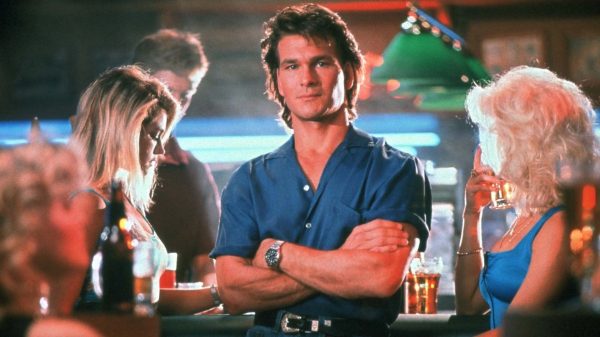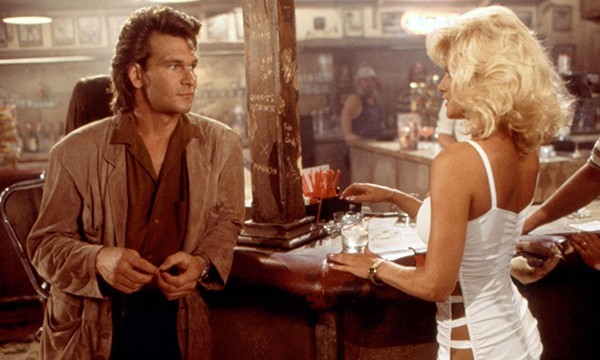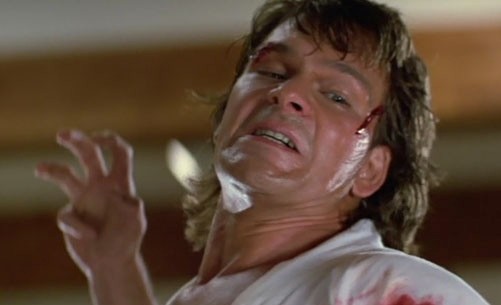Tom Jolliffe looks back at the glorious action gem Road House…

To quote movie aficionado Gordy LaSure (aka Richard Ayoade) from his book The Grip of Film (excellent read I shall add); “In the opening shot of Rowdy Herrington’s 1989 magnum opus about the secret world of security guards, the camera frames a pair of high heels pivoting out of a recently opened car door, before panning up to a HOT GIRL walking toward a club in a CLINGY DRESSS. The title comes up, salmon pink: Road House. Straight off the bat we know this film has style.”
Sometimes you find yourself flicking through Netflix (other services are available). You scroll through the array of titles. We all have certain old favourites, that no matter how many times we’ve seen them, just magnetise you to view again. One film which has been calling me back to it recently for its glorious allure, is Road House. A hit film pumped out between Dirty Dancing and Ghost in the late great Patrick Swayze’s illustrious career. Whilst the other two of that era are iconic, Road House has slowly attained an ever growing level of cult acclaim in the years since its release. The film was a hit. It struck a chord with audiences, and the Dirty Dancing guy was accepted by box office patrons as an action man here.
If we look back on Swayze’s career, from this, to Red Dawn, to Point Break, he certainly had action chops. Critics were largely kind to Dirty Dancing and Ghost. They weren’t quite so kind to Road House, but the film needed time to ferment. The level of awesomeness within needed time to develop, to come to a point where you’re not just enjoying it as a bog standard smack em up, and you’re not viewing it as a film so bad it’s good. I can kind of see those two points of view, but as a work of action cinema, Road House has more to it.
So what makes Road House great? Yes, there’s the salmon pink title fonts, but it’s got an array of great action elements. Director Rowdy Herrington seems to inject the film with plenty of style and he allows a collective of stunt guys to run riot with the action. As a film it’s a stunt mans wet dream. There are bar brawls, mano-a-mano face offs, plenty of breakaways and vehicular stunts (car flips, a monster struck). The film is shot by cinematographer extraordinaire Dean Cundey. A long standing specialist in photographing genre films (he’s shot many with John Carpenter as well as Jurassic Park and Roger Rabbit) and his work always looks great. Road House is no exception. Expect plenty of night work, neons, and good use of fire on several scenes too, all perfectly captured in widescreen. It’s a Joel Silver production, during the peak of Silver’s power. So it has bang for the buck and the kind of gloss we’d see in other Silver classics like Lethal Weapon, Predator and Die Hard. Then to top it all off, we’ve got Michael Kamen delivering a great score, and a soundtrack beefed up by The Jeff Healey Band (who appear in the film as a band).

Road House is also very well cast. Swayze took to the role incredibly well and his dancing skills ended up translating well to on-screen fighting (with more than a little help from martial arts legend Benny The Jet Urquidez training him, and choreographing the fights). As Dalton, Swayze has the perfect blend of stoic badassedness and a poetic vulnerability thanks to a haunted past. How many protagonists are haunted because they ripped someone’s throat out? I’ll tell you…one…and it’s Dalton, in Road House. His former mentor Wade is played with effortlessly charming drawl by the master of said art, Sam Elliott. Despite some of the silliness, the film forms a good connection between the two and they have a chemistry. Kelly Lynch as Dalton’s love interest has a little more to her character than atypical for a film like this too. Ben Gazzara absolutely revels in being a total bastard. Villains played with such relish are always memorable.
Part of the sheer brilliance of Road House lies in the fact that Dalton is haunted by his throat ripping episode. Inevitably of course, a man comes to a choice between dying or ripping a throat out. There are no other options on the table. You’re gonna rip the throat out of the bastard in front of you. Naturally, Dalton is faced with that choice once again, where he can either die or rip a guys throat out. Such is the level of fuckery from his foe here, that as an audience we feel like this douche really needs his throat a-rippin. That whole aspect is cheesy, but it’s a perfect 80’s action morality motif. What it does do is show an interesting arc in some way for Dalton. In the beginning of the film he’s this calm, collected and philosophical guy who’d rather find the peaceful solution before he absolutely has no choice for violence. By the end he’s on a vendetta mission to get to Gazzara (having torn out the throat of a henchman).
Road House perfectly represents a close to 80’s action. It’s full of cheese, but it’s also got so many impeccable film-making elements and fight scenes, which for the western style, have rarely been bettered in American cinema. There’s a real revelry in making an all action rock ‘n’ roll brawl-fest. Swayze is the epitome of cool in this. It’s an essential action classic. What do you think about Road House? Let us know on our social channels @flickeringmyth…
Tom Jolliffe is an award winning screenwriter and passionate cinephile. He has a number of films out on DVD/VOD around the world and several releases due in 2020/21, including The Witches Of Amityville (starring Emmy winner, Kira Reed Lorsch), War of The Worlds: The Attack and the star studded action films, Renegades (Lee Majors, Billy Murray) and Crackdown. Find more info at the best personal site you’ll ever see here.












